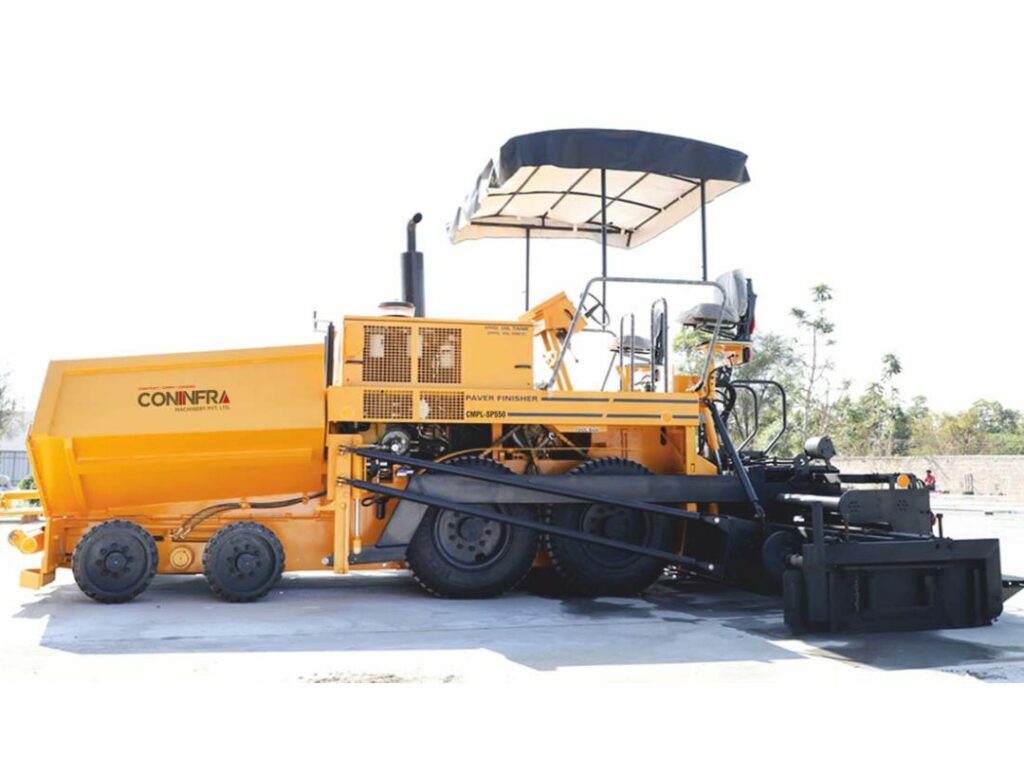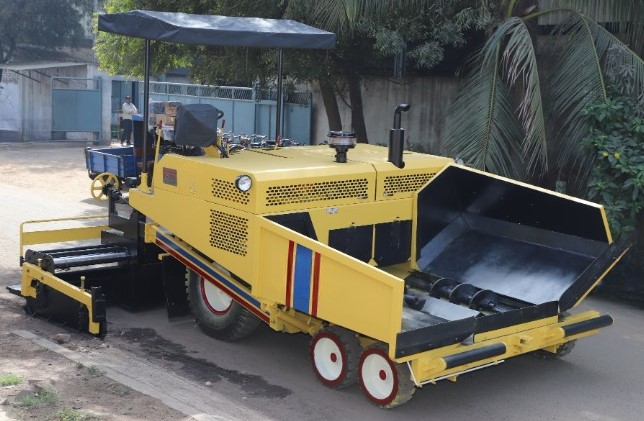Wheeled asphalt pavers are heavy-duty machines used for efficiently laying asphalt during road construction and paving projects. Consisting of a wheeled chassis equipped with a hopper to hold asphalt mix, these machines distribute the material evenly along the road’s width, ensuring uniform thickness and smoothness. The pavers feature adjustable screeds that level and compact the asphalt to the desired thickness, creating a sturdy and durable surface suitable for vehicular traffic.
Where are wheeled asphalt paver used?
Wheeled asphalt pavers are used in various construction projects, some common applications include:
- Road Construction: used in the construction of new roads, highways, and expressways.
- Resurfacing: used to overlay the existing pavement with a new layer of asphalt.
- Parking Lots: used in the construction of parking lots, both for commercial and residential properties.
- Driveways: Homeowners and contractors use wheeled asphalt pavers to pave driveways, providing a smooth and durable surface for vehicles to drive on.
- Airport Runways: used in the construction and maintenance of airport runways and taxiways, where precise paving is essential for safe aircraft operations.
- Industrial Sites: used to pave roads within manufacturing plants, warehouses, and distribution centers to facilitate smooth traffic flow for vehicles and equipment.
- Urban Streets: used to pave urban streets, ensuring safe and reliable transportation routes.
Components of wheeled asphalt paver
- Hopper: Stores asphalt mix before distribution.
- Conveyor System: Transports asphalt from the hopper to the screed.
- Screed: Levels and compacts asphalt to desired thickness and smoothness.
- Wheels: Provide mobility for the paver.
- Engine: Powers the paver for propulsion and operation.
- Controls: Allow operators to adjust paving settings.
- Operator Platform: Where the operator controls the paver and monitors performance.
How does a wheeled asphalt paver work?
- Setup: The paver is positioned at the starting point of the paving area, usually at one edge of the road or surface to be paved.
- Loading: Asphalt mix is loaded into the hopper of the paver. The hopper typically has a capacity to hold a significant amount of asphalt.
- Start Conveyor: The operator activates the conveyor system, which starts to transport the asphalt from the hopper towards the screed.
- Distribution: Asphalt is evenly distributed across the width of the screed as it moves along the conveyor. This ensures uniform coverage over the entire width of the road.
- Levelling: The screed, set to the desired thickness, levels the asphalt as it passes underneath. This process ensures a smooth and consistent surface.
- Compaction: Compactors within the screed compact the asphalt, increasing its density and ensuring durability. This step is crucial for creating a stable road surface.
- Adjustments: Throughout the paving process, the operator may adjust the speed of the paver, the angle of the screed, or other settings to optimize the quality of the pavement.
- Finishing Touches: Once the asphalt has been laid and compacted, any necessary finishing touches are made to ensure a smooth surface. This may involve using hand tools or additional machinery.
- Repeat: The paver continues moving forward, repeating the process until the entire length of the road or surface has been paved
Advantages of wheeled asphalt paver
- Versatile for various paving projects.
- Easy mobility on roads and job sites.
- Faster paving with higher travel speeds.
- Improved manoeuvrability in tight spaces.
- Lower initial cost compared to tracked pavers.
- Flexible for different asphalt mixes and thicknesses.
- Minimized ground disturbance and damage.
- Quieter operation for nearby residents.
- Simplified maintenance requirements.
- Enhanced fuel efficiency.
- Comfortable ride for operators.
- Safer operation on uneven terrain.
- Quick setup for efficient project execution.
Types of wheeled asphalt paver
Standard Wheeled Asphalt Pavers:
Standard wheeled asphalt pavers are the backbone of road construction projects, offering versatility, reliability, and cost-effectiveness. These pavers are designed to handle a wide range of paving tasks, from small residential streets to medium-sized commercial projects. Equipped with adjustable screeds and powered by diesel engines, they excel in laying asphalt quickly and evenly. Contractors and construction companies of all sizes rely on standard wheeled pavers for their straightforward design, ease of operation, and affordability. Whether it’s a neighbourhood road or a parking lot, these pavers get the job done efficiently and effectively, making them essential equipment for any paving operation.

Highway-Class Wheeled Asphalt Pavers:
Highway-class wheeled asphalt pavers are the go-to choice for large-scale highway construction projects, where speed, precision, and efficiency are crucial. These pavers are engineered with advanced features and technologies to handle high volumes of asphalt and achieve precise paving results over long distances. With wider paving widths, higher paving speeds, and automatic grade and slope control systems, they excel in constructing new highways, widening existing roads, and resurfacing large road sections. Highway-class pavers are indispensable equipment for highway contractors and government agencies overseeing major infrastructure projects, ensuring that critical roadways are built to the highest standards and specifications.

Commercial-Class Wheeled Asphalt Pavers:
Commercial-class wheeled asphalt pavers are tailored for smaller-scale paving projects in urban and suburban areas, such as municipal roads, parking lots, and residential streets. These pavers offer a balance of performance and manoeuvrability, making them adept at navigating tight spaces and confined areas with ease. Featuring adjustable screeds, ergonomic controls, and user-friendly interfaces, they ensure precise paving results while minimizing operator fatigue. Contractors working on a variety of projects favor commercial-class pavers for their versatility and reliability. Their compact size and agility make them well-suited for urban environments where space constraints and precision are crucial for achieving quality pavement surfaces.

Hydrostatic Wheeled Asphalt Pavers:
Hydrostatic wheeled asphalt pavers utilize hydrostatic drive systems for propulsion, offering smoother acceleration, precise control, and enhanced manoeuvrability. Engineered for projects requiring high precision and quality, such as airport runways, bridge decks, and tram tracks, they excel in delivering superior paving performance with minimal operator effort. Equipped with advanced features like automatic grade and slope control, hydrostatic pavers ensure accurate paving results even on challenging terrain. Their ability to achieve consistent pavement profiles makes them the preferred choice for contractors and government agencies seeking reliable and efficient paving equipment for specialized applications that demand the highest standards of quality and performance.

Mechanical Wheeled Asphalt Pavers:
Mechanical wheeled asphalt pavers rely on mechanical drive systems, such as gears or chains, for propulsion. Known for their simplicity, reliability, and ease of maintenance, these pavers are suitable for a wide range of paving applications. Capable of achieving precise paving results while remaining cost-effective and easy to operate, mechanical pavers are often chosen for smaller-scale paving projects, residential streets, and maintenance work. Their robust construction and straightforward operation make them reliable choices for contractors seeking durable and efficient paving equipment that can withstand the rigours of daily use.

Why the demand for wheeled asphalt pavers in india?
- Rapid infrastructure development projects, including roads and highways.
- Increasing urbanization leading to demand for paved surfaces in urban and suburban areas.
- Growth in the industrial sector requiring well-built transportation infrastructure.
- Demand from the booming real estate sector for roads, driveways, and parking lots.
- Adoption of modern construction practices favouring advanced equipment like wheeled asphalt pavers.
Conclusion
Wheeled asphalt pavers play an important role in the construction and maintenance of roads, highways, urban infrastructure, and various other paving projects. As India continues to undergo rapid development and urbanization, the demand for efficient, reliable, and versatile paving equipment like wheeled asphalt pavers remains strong. These machines not only contribute to the creation of smooth and durable asphalt surfaces but also facilitate economic growth, connectivity, and safety across the country.
Image Source: volvoce.com/india/en-in/, apollo-equipment.com, ammann.com/en/, coninfra.in, ashtvinayakpaver.com,


